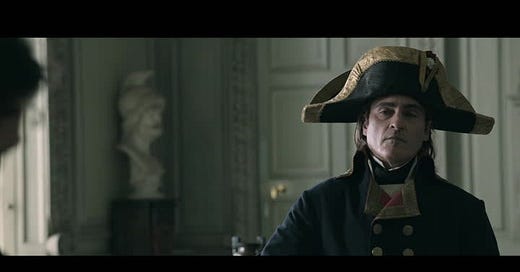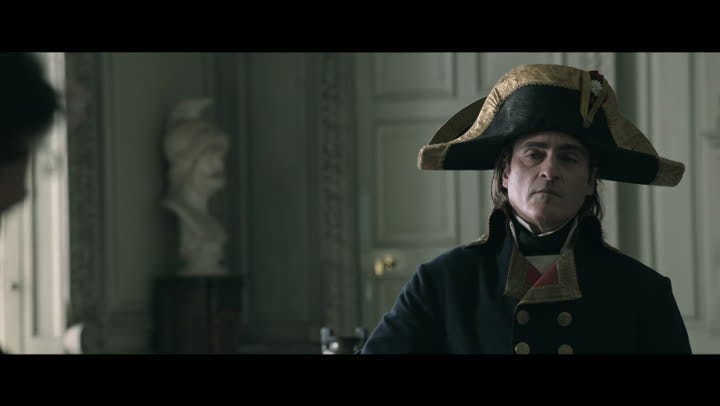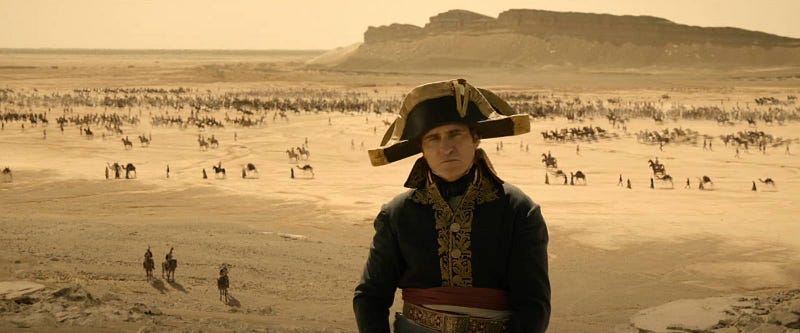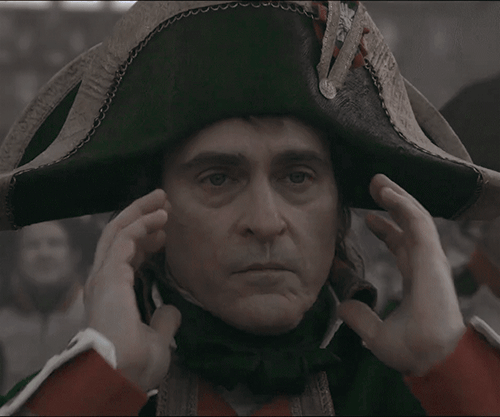Napoleon Review: The Only Thing Explosive About Ridley Scott’s War Epic Is When The Cannons Fire
“I follow in the footsteps of Alexander the Great and Ceasar” — with punchlines like that, I did perhaps expect Ridley Scott to serve up a…
“I follow in the footsteps of Alexander the Great and Ceasar” — with punchlines like that, I did perhaps expect Ridley Scott to serve up a modern cinematic classic of the 2020s with his big budget war epic Napoleon. But after watching this toothless depiction that lacked depth & intrigue with a plotline that doesn’t quite know what to do with itself, or where to go, I was left rather disappointed with the most memorable aspect of the evening being the dinner that I had at Arbab after the film.
On a day which hinted at being slightly cold in the early hours of the morning in late November with the onset of winter in Bombay fleetingly and deceitfully beguiling not just me but all Mumbaikars this year, I made the journey to BKC’s Jio World Drive via a ghastly approach route to take the comparatively newer BKC flyover, that leads up to the more recently developed bustling commercial sector of the city to watch this Ridely Scott-crafted war film/bio-pic on the first day of its release — “First day first show” — as they say in Bombay.
It’s been a much hotter winter than others in the recent past here in Mumbai, and despite the time being past 6pm, I was still feeling the heat in my shirt & shorts almost mirroring what Napoleon was feeling in the letter he writes to his wife Josephine as he commands his army during the liberation of Egypt.
The scene had some stunning aerial & wide shots, of the pyramids & Napoleon’s legion & the protagonist himself, apart from a really weird scene where he touches & tastes the corpse/mummy of an Egyptian pharaoh, almost as if to imbibe the dead mummy’s energy, while perhaps serving as a metaphor for his own eventual fate.
But this film’s script was a sheer disaster from start to finish. Although, the key points of depicting the timeline of Napoleon’s achievements & rise to power & then his eventual downfall were the crux of the plot, which the film did do justice to, there was absolutely no artistry or depth or finesse or any sort of interesting and gripping aspects in this screenplay; David Scarpa got this all wrong.
I harboured very elaborate expectations for this film, partly because its a historical film made by Ridley Scott & partly because Joaquin Phoenix was cast as Napoleon. Ridley Scott’s Gladiator, is by far one of my favourite films from my youth, made by the enigmatic director who often manages to deliver some groundbreaking cinema.
Scott is known to tell exquisite stories in his films, Gladiator being one of his finest cinematic efforts. But Phoenix’s performance as Napoleon is a farcry from his iconic role as Commodus, playing the antagonist to Russel Crowe’s Maximus — “My name is Maximus Decimus Meridius, commander of the Armies of the North, General of the Felix Legions and loyal servant to the true emperor, Marcus Aurelius. Father to a murdered son. Husband to a murdered wife. And I will have my vengeance, in this life or the next,” & “Am I not merciful?” — Gladiator had it all.
Ridley Scott’s catalogue comprises several compelling films over the years in his expansive repertoire, and some of my favourites after Gladiator, include Black Hawk Down, Hannibal, American Gangster, amongst others. Even his relatively recent films The Martian and The Last Duel are films that are, in their own right, brilliant films that stamp Scott’s ability to tell complex stories in epic proportions & in creating cinematic spectacles, striding diverse genres, although the historic/historical fiction genre is very much his preferred genre of making films.
So this was right up his alley, and there are few directors in Hollywood that would fit making this bio-pic so perfectly like the needle of a vinyl record player fitting the grooves of a record, to play the enchanting music. But the movie was like a generic jazz album by an obscure European jazz band from the ’50s — all show, (brass sections et al) and no tell.
Even Robin Hood, which was quite rightly a box-office bomb, & which was also quite a poor film in its entirety was still narrowly better than Napoleon; may be just a bit, like 5-10% better or nearly as bad, whatever you prefer.
When the trailers of Napoleon dropped earlier this year, I billed this one up to be one of 2023’s best films. But that notion tanked quickly as the movie progressed.
The history of the life of power-hungry French general and then emperor of France, Napoleon Bonaparte, might not quite make it to bedtime stories in the country of France or be delved into deeply in history class at school all over the world. In fact, I vaguely remember studying just a solitary chapter about Napoleon in our history text book back in 9th grade or so(you can thank the Indian ICSE curriculum). Being rather interested in European history as a schoolboy while studying up until grade X in St. Mary’s School ICSE, Mumbai, historical films, especially about European history are definitely something I’ve come to appreciate & gravitate towards.
The history of Europe is firmly forged in war, and Napoleon was the last of the 18th & 19th century’s most deadly & feared generals & leaders. Especially for his military might, achievements and his ability to win battles & consequently, wars. The Napoleonic wars also left an indelible mark on Europe, especially considering the death toll, which neared over 3 million.
The film, does state those numbers in the end in the epilogue, maybe calling for some reflection for the sheer extent of the loss of life during the wars Napoleon waged, but between the portrayal of the first battle, i.e. the siege of Toulon in 1793, and famed battle of Waterloo in 1815 that is the most pivotal battle in the film nearing its finale, there was much left to be desired in terms of characterization and story. Even SEGA’s hit tactical strategy game, branded “Napoleon” is arguably more immersive and entertaining.
But coming back, especially, by the end of the film, there are no other interesting characters that complement the plot other than Napoleon & Josephine and we don’t really get to know much about the true personality & psyche of Napoleon other than his lust for power & war and being blinded by ambition & conquest that ultimately leads to his downfall; the story & characters could have had so much more to them.
While the cerebral and psychological aspects of Napoleon’s ambition & success and failure could have been elucidated with more innovative approaches and detail, the film only hints at them throughout the plot. Even the political scheming & propaganda isn’t shed light on or portrayed very astutely and pales in comparison to Gladiator as well.
The Toulon battle was really well shot, I would say, and was Napoleon’s first landmark achievement in his journey from obscurity & the lower tiers of the army to becoming the leader of France’s armed forces & then becoming emperor of France. Scenes like Napoleon’s horse getting hit by a cannon ball & the way the French army seize the fort of Toulon & take out the English ships docked along the port by creating a blockade was a great start to the film. Just before that, the film opened also rather promisingly as Marie-Antoinette is beheaded at the gallows as she walks to her impending death being bombarded by vegetables being hurled at her by the mob of citizens, as a comparatively younger Napoleon watches on grimacing & brooding, very French, indeed. But that’s about as French as this movie got.
From a military tactical standpoint, Ridley Scott did deliver a thorough, well-researched and comprehensively shot text-book portrayal of Napoleon’s military nous & tactics, which are still studied and analysed by armed forces all over the world to this day. They also depict an interesting military tactic employed by the British army in the final battle of Waterloo where they huddle together in a square formation akin to the ancient Roman legionary battle formation called “Repellere equites”, but armed with guns instead of spears or swords. The square formation forces the French cavalry to circle the British unit as they take out the French soldiers on horseback one by one as they circumnavigate them.
The positives of the film are of course the bloody battles & war scenes. Whether it’s the cannon balls falling through the thin layer of ice along with bloodied bodies of soldiers that sink underneath it, or when Moscow burns as Napoleon’s army reach the city after making a painstaking journey from France through unforgiving terrain into Russia, the war/action scenes were expected to be portrayed in detail, given the film’s budget. From Toulon and Austerlitz to Borodino and Waterloo, the film manages to showcase all of Napoleon’s historic conquests with the underpinning themes of his tactical genius, but even Ridley Scott’s epic battle sequences couldn’t mask the frailty of Scarpa’s script.
The battle of Waterloo, that serves as the final battle of the film — comprising 300,000 English & Prussian soldiers against 120,000 French soldiers — is still rather exciting & entertaining but by the time it ensues in the film, it became one too many battle sequences in the movie, so its impact was arguably hindered & negligible because of viewer fatigue.
This particular shot where Napoleon covers his ears as the cannons fire, repeats consistently, but it just got amusing and borderline hilarious as it kept repeating, almost like “Oh, here we go again”. The cannon fire was the most explosive aspect of the film(to reiterate this article’s title), and I almost pity the sound designer for the sheer amount of times he had to add in WAV audio clips of the cannons going off.
The battle sequences are the only memorable aspect of the movie, and there are in total 5 or 6 odd battles fought throughout its runtime, while the Dolby Spatial Audio system in the theater further accentuated the gory & elaborate depictions of war, but other than the final delivery of the film in theaters, there wasn’t much to even bat an eyelid about forget being enthralled or gripped by the film. This was glaringly evident because of the spineless & desultory nature & conception of the script.
Cinema is the combination of several artistic aspects that are woven together & interlinked, each one feeding off the other, so usually, if one aspect is under-par such as this movie’s screenplay, the other aspects have to pull it out of mediocrity. However, Martin Phipps score is an abomination. Yes, he did try to go in different directions & with different ideas, with the French classical & opera themes that rove in and out but the lack of an inspiring and immersive score, that totally lacked emotion especially for the battle sequences lead to a dour & at times listless experience of watching all the action taking place on-screen.
The cinematography was commendable & at times captivating visually, as Ridley Scott’s work usually is, but it also serves as a perfect example of how no matter how well you shoot a film aesthetically, or artistically, a poor script can prove to be a film’s undoing if it lacks substance.
An actor of the Joaquin Phoenix’s caliber usually doesn’t err, get it completely wrong or flatter to deceive very often, but this film is a rare blemish in the feathers in his cap to his otherwise staggering performances in front of the camera.
The actor who delighted audiences in his most recent role in Joker, Phoenix was perhaps still indulging in the after effects of his Joker enigma despite what was a tailor-made role for him as he plays the unruly “brute” from Corsica who rises through the ranks of French politics to become emperor with his undying quest to be remembered in the annals of history in post-revolutionary France.
The unusual grunting in the bedroom & under the breakfast table, further added nonsensical & cliche characterization perhaps to exemplify that Napoleon was a ruffian, which just made for bad taste. To be fair, if it wasn’t for Phoenix’s acting, that drove the film, this would be more of a debacle than it actually contrived to be.
Vanessa Kirby, was also very underwhelming as Napoleon’s wife Josephine. Kirby was almost typecast for this role, especially considering playing princess Margaret in the TV show The Crown, and this role, as yet another royal, was something that went hand-in-glove for her, but her performance was patchy, lacked authority & she really didn’t take hold of the role & make it her own. The line “You are nothing without me,” hardly held good in terms of her role in the film.
Apart from certain punchlines and one scene where she’s forced to publicly divorce Napoleon because she’s unable to bear a child (which also involves Napoleon slapping her), she really doesn’t carry this film as its leading female character or add any spark to her portrayal of Josephine, while her eventual death because of diphtheria hardly evokes any emotion or a tear.
The narration sequences of the letters Napoleon writes to Josephine, and vice-versa back & forth while Napoleon is at war, perhaps added a slight bit of interest & remained constant throughout the film, and those monologues were the only thing well-written in the script, but in-all, this was a largely disappointing movie in terms of its final product.
In the end, Napoleon could have been made with much more care, craftsmanship & guile. While the attention to detail was prevalent & the battle sequences didn’t disappoint, the lack of plot twists or a screenplay that checks all the regular boxes of what a screenplay should contain, or could be considered its heartbeat let alone serve as a basis for intrigue, the film is as forgettable as Napoleon’s exile to St. Helena in the burning embers of his life.
Much like the untimely end to Napoleon’s life, his journey, his time as France’s king & his conquests which seemed to bill up to be etched in greatness, the film fades away into anonymity in a disjointed & depthless story that is almost just a chronological timeline of historical events.
Final rating — 5/10






